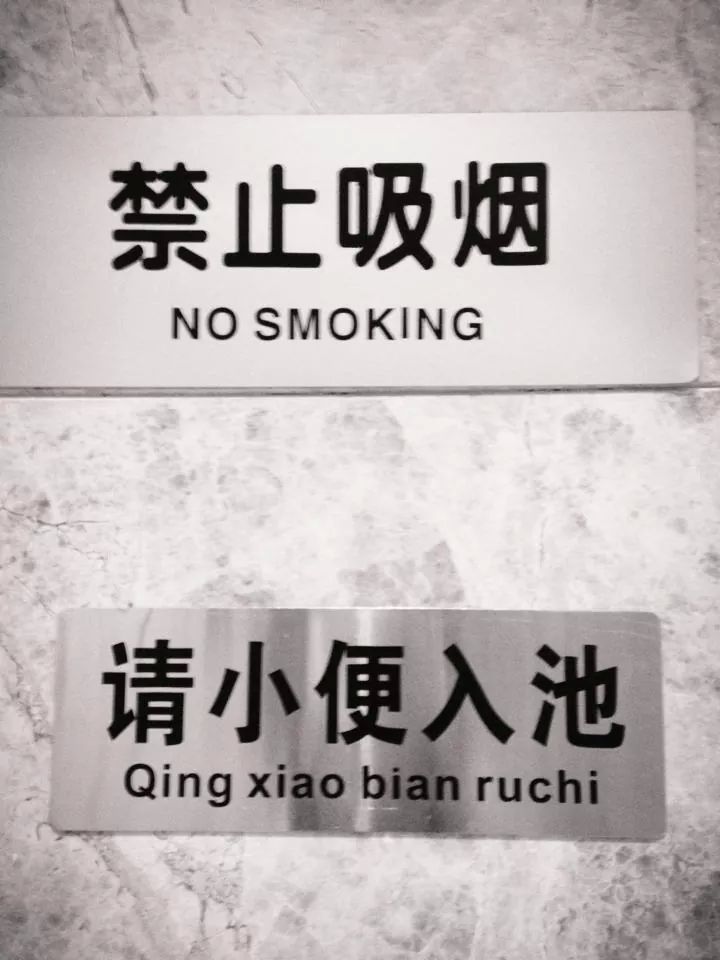Please pee in the pool
« previous post | next post »
Kenneth Yeh sent in this pair of signs from a restroom in China:
The first sign is straightforward,
jìnzhǐ xīyān 禁止吸烟
…with the correct translation: NO SMOKING. It is odd, however, that the second sign declines to provide an English translation, giving only pinyin romanization:
Qing xiao bian ruchi 请小便入池
With tones marked and correctly parsed, that would be:
qǐng xiǎobiàn rù chí
Why didn't they translate this into English?
If you use the main online translation websites (Google Translate, Baidu Fanyi, Bing Translator, and iCIBA), they all say: "Please urinate in(to) the pool".
Somebody at least had the good sense to say, "Noooooo, that won't do." So they decided simply to leave it in pinyin.
Another possible reason is that it was intentionally left in pinyin for Chinese citizens who can't read characters or English. We have encountered this phenomenon before: "Pinyin in practice" (10/13/11).
Lexical notes:
qǐng 请 ("please")
xiǎobiàn 小便 ("piss; pee; urine")
rù 入 ("enter")
chí 池 ("pond; pool")
biànchí 便池 / xiǎobiàn chí 小便池 ("urinal")
For additional context and background, see this latest post in our "urine" series: "Greater and lesser conveniences" (6/25/14), with a list of earlier posts on urination.

Rubrick said,
August 4, 2014 @ 4:44 pm
Can you elucidate what the second sign actually says, and why it would lead machine translation astray?
harry said,
August 4, 2014 @ 5:40 pm
Presumably it means the same as a sign I saw at the restrooms at the reclining Buddha at Bangkok: "Please do not inject water into the ground."
Matt said,
August 4, 2014 @ 8:40 pm
Surely it's just "Please urinate in urinal", with the word for "urinal" 小便池 abbreviated to just 池 in order to avoid repeating the 小便 from the first half of the sentence?
John Chambers said,
August 4, 2014 @ 11:14 pm
Hmmm … a quick check of several dictionaries give (English) verbs such as "enter, come in(to), join" as the primary translations of 入. This would suggest that the translation mostly just needs a comma: "Please urinate, (and then) enter the pool." This makes perfect sense. Is it possible that this is what was meant, and explains the apparent rejection of the weird machine translations? I'm far from an expert on Mandarin, but I've seen other things phrased similarly, without commas or the sort of words that we'd use in English to indicate a time sequence.
Here in the US, there are sometimes signs of the form "Please shower before entering pool." What would be a colloquial way to say that in Mandarin?
Akito said,
August 5, 2014 @ 5:31 am
My guess is that qing assumes the role of a polite causative meaning roughly "ensure". So
Qing ("please ensure") xiaobian ("urine") ru ("enters") chi ("urinal").
Another explanation might be to regard ruchi as the resultative of the action xiaobian, but I'm not sure such a construction is common.
Bathrobe said,
August 5, 2014 @ 8:41 am
The sign was in a toilet, not at a pool. The meaning is 'Please urinate in the urinal'. There is a post at 人民网 where the author asks incredulously when greeted by such a sign, 'Don't we Chinese even know how to use a toilet?'
Another very common sign at Chinese urinals exhorts users to stand close to the urinal so as to prevent any urine dripping to the floor (presumably for the sake of female cleaning staff, and also probably because stale urine is pretty pungent). I'll check next time and tell you what they say — they are normally in parallel couplets suggesting that it's more civilised to stand close.
Rubrick said,
August 5, 2014 @ 3:55 pm
Thanks to all who clarified. I'd overlooked the word "restroom" in the opening paragraph.
Bathrobe said,
August 5, 2014 @ 10:48 pm
Gleaned from the company urinals :)
向前一小步
文明一大部
Move forward a small step
Cultured behaviour a big step
To reinforce the message, this is in smaller print below:
你我多一份自觉
环境多一分清洁
If you and I (=everyone) has greater awareness
The environment will have greater cleanliness
I find these things devilishly hard to translate. The parallelism in the Chinese is hard to recreate in English because of grammatical restraints. Plus words like 文明 (literally 'civilisation' but actually meaning 'manners, cultured behaviour') and 自觉 (literally 'awareness' but commonly used in Chinese in the meaning of 'consideration') are hard to translate properly.
Matt said,
August 6, 2014 @ 1:37 am
Bathrobe, isn't the first of your examples part of the whole family of such signs that are basically a play on "One small step for man, one giant leap for mankind"? Or am I seeing references where none exist?
Bathrobe said,
August 6, 2014 @ 5:51 am
Quite possibly! But I don't think it's normally translated into such elegant Chinese. The Internet gives translations like:
对个人来说是小小的一步,对于人类来说则是极大的飞跃。
这是一个人的一小步,却是全人类的一大步。
And yet it would go very nicely into a couplet in Chinese.
Victor Mair said,
August 6, 2014 @ 7:56 am
We have previously touched upon this type of injunction concerning toilet etiquette in posts such as these two:
"Signs from Kashgar to Delhi"
"English tips from Li Yang, noted wife-beater and pedagogue"
BTW, Li Yang, the founder of Crazy English, has recently converted to Buddhism at Shaolin Temple, home of the famous "fighting monks".
As for the famous Neil Armstrong quotation, from which the Chinese restroom adages are clearly derived, see these Language Log posts:
"One small step for…"
"Remembering Neil Armstrong and his 'one small step'"
"One small step backwards"
"Armstrong's abbreviated article: notes from the expert"
Kevin McCready said,
August 8, 2014 @ 11:48 am
An anatomy of Chinese : rhythm, metaphor, politics / Perry Link. has a nice description of these sort of poetic rhythmic injunctions